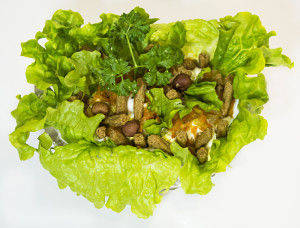 Being the best competitor you can be within your chosen sport isn’t easy, and you don’t only have to train hard, compete to the best of your ability, and be single-minded in your focus, but you also have to look after your body and treat it like the temple it deserves to be.
Being the best competitor you can be within your chosen sport isn’t easy, and you don’t only have to train hard, compete to the best of your ability, and be single-minded in your focus, but you also have to look after your body and treat it like the temple it deserves to be.
Dr Adam Rocchi, a chiropractor in Perth, is here to give you his nine best foods for athletes. See if you can pack these into your diet.
Berries
Not only are berries delicious, but they are packed with antioxidants, which are important for overall health and wellbeing, helping to protect the body against free radicals which form during times of intense physical activity. Eating plenty of antioxidants boosts your immune system, and helps to keep your muscles healthy.
In addition to this, the best way to reduce delayed onset muscle soreness (DOMS) is by consuming plenty of berries in your diet. Many studies have been done to back up this claim, with one controlled study conducted on endurance athletes which suggested that a daily blueberry consumption significantly reduced oxidative stress and inflammation, compared to those who didn’t pack their diet with so many. Food for thought indeed.
Oily fish
Oily fish is a great source of omega 3, which has a range of health benefits, but in terms of athletic activity, it can help reduce inflammation within the muscles and tissues. Try and eat around two lots of oily fish per week.
We know that seafood can be an acquired taste, but it’s certainly a food group which is worth getting a taste for. Bodybuilders who avoid seafood completely are totally missing out on some important nutrition which could boost their performance. Fish is full of easy to digest amino acids, which are on par with supplements such as whey protein, as well as containing an array of minerals which go hand in hand with testosterone and thyroid function.
Quinoa
Quinoa is one of the most flexible foods there is, because you can make it sweet or savoury. Quinoa is a superfood, because it is rich in amino acids, and if you are an athlete you will need this to help your muscles recover effectively.
Quinoa is also gluten free, which is great for those with a gluten allergy, whilst also being packed with protein and fibre. All nine essential amino acids are contained in one serving, as well as 222 calories (for one cup), 8g of protein, 39g carbohydrate, 4g of fat, and 5g of fibre. On top of this, you’re getting a good serving of vitamins B and E. All from one food group!
Pasta
It’s a fallacy that pasta isn’t great for you, because provided you don’t overdo it, pasta can be a great energy booster. Switch to wholegrain versions instead of the white pasta option, and you’ll be getting all manner of health benefits.
Bananas
You often see tennis players snacking on bananas during breaks, and this is because of the amount of potassium they contain. During physical activity you sweat out potassium, so it’s important to put it back. Potassium also helps to cut down on the chance of muscle cramping.
Beans
Packed full of plant-based protein, beans don’t contain any saturated fat, which is good for your heart, and they can help you feel fuller for longer, so you don’t feel lacking in energy throughout your training regime.
Dark green vegetables
Green is your lucky colour! Dark green vegetables, such as broccoli, kale, and Brussel sprouts are rich in vitamins, antioxidants and fibre. If you can, eat them raw for a bigger boost.
Pumpkin seeds
If you are low in iron then you won’t be able to compete to the best of your ability, becoming short of breath, low in energy, and you may trouble controlling your heart rate during exertion. Pumpkin seeds are a great source of iron, with a plethora of other health benefits too.
Nuts
You should be going nuts about nuts, because they are a very healthy snack which give you a fuller for longer boost, and are great for recovery after exercise. It doesn’t matter particularly which kind of nut you go for, as most are equal in terms of their calorie content, and when eaten in moderation, they are all a healthy addition to your diet.
Nuts are full of omega 3 fatty acids, protein, and fibre, which help you feel fuller for longer and suppress your appetite a little.
Look at it this way, the lowest calorie content nuts are almonds, followed by cashews, and then pistachios. These are all delicious and do a major amount for your body. Avoid any nuts which are packaged or roasted in oil, as these aren’t going to pack as much of a punch and can lose some of their goodness in the production process, so instead go for raw or dry roasted varieties.
If you want to learn more about how your diet can help you in your competitive future, call the practice on (08) 61508783 to arrange an appointment.


No comments yet.